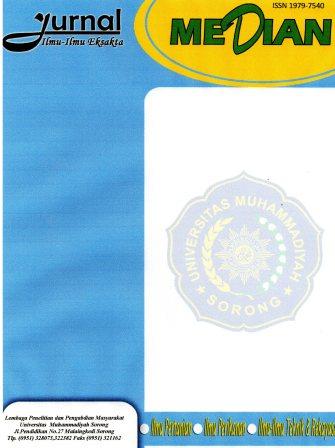The Role of the Food Crops, Horticulture and Plantation Office of Sorong Regency in the Farmers Group in Salawati District
DOI:
https://doi.org/10.33506/md.v13i1.1203Keywords:
Role of Agriculture Service, Farmer GroupAbstract
Life that comes from food must inevitably be fulfilled, the involvement of the local economy will inevitably bring serious challenges. So it is reasonable to say that globalization will bring benefits if the response of national and local governments can properly mobilize local resources. The resources that are owned in relation to farming groups cannot be separated from the role of local governments in efforts to improve a decent life for farmers and the farming groups themselves. The research was carried out at the Food Crops, Horticulture and Plantation Service of Sorong Regency against the Farmers Group in Salawati District from June to September 2020. This research used descriptive methods by survey and cross sectional methods which used samples from the Department of Agriculture and farming groups in the District. Salawati. The analysis used is a Likert scale and a frequency table. Based on the results of the analysis, the role of the Agricultural Instructor as Motivator, Facilitator, Communicator and Innovator is in the very good category, while the participation of farmers in the role of the Dinas is in the Good category. Thus the suggestion that is conveyed is the active role of every institution involved both as extension workers and farmers who are pro-active in carrying out their duties and responsibilities. This score or number will be at 100 percent if all parties can carry out the function properly.References
Agustino Leo. Dasar- dasar Kebujakan Publik (Bandung : Alfabetha, 2012), 7
Anton Apriyanto dalam Kaman Nainggolan, Pertanian Indonesia Kini dan Esok. (Jakarta : Pustaka Sinar harapan, 2005). v.
Bannock Graham. R.E Baxter dan Evan. A Dictionary of Economics (Inggris : Penguin Books Ltd, 2004).
Basri Hasan ,. Dasar-dasar Agronomi. (Jakarta : Raja Grafindo Persada. 2005).1.
Bungin Burhan ,. Metodologi Penelitian Sosial & Ekonomi. Format-format Kuantitatif dan Kualitatif untuk Studi Sosiologi, Kebijakan Publik, Komunikasi, Manajemen dan Pemasaran. (Jakarta : Kencana Prena Media Group. 2013). 30
Daniel Mohar, Pengantar Ekonomi Pertanian. (Jakarta : Bumi Aksara, 2001)
Downey D.W.,Erickson S.P. Manajemen Agribisnis Edisi Kedua (Jakarta : Erlangga, 2006), 18
https://eprints.uny.ac.id/46788/15/PENDUKUNG%20LKPD%PERTUMBUHAN%20 DAN %20PERKEMBANGAN.
Jhingan M. L., Ekonomi Pembangunan dan Perencanaan, (Jakarta : Raja Grafindo Persada, 2008). 243.
Kementrian Pertanian Republik Indonesia.. Pemberdayaan Kelompok Tani dan Gapoktan. (Jakarta : Kementrian RI, 2009).
Mosher, A.T. Menggerakkan dan membangun Pertanian. (Jakarta : Yasaguna. 1983)
Muhammad Zid dan Ahmad Tarmiji, Sosiologi Pedesaan. Teoretisasi dan Perkembangan Kajian Pedesaan di Indonesia, Cetakan ke-1. (Jakarta : Rajagrafindo Persada, 2016), .8.
Peraturan Menteri Pertanian Republik Indonesia Nomor 67/permentan/sm.050/12/2016. (Jakarta : Kementerian pertanian. 2016).
Peraturan Menteri Pertanian Nomor 82/Permentan/OT.140/8/2013 (Jakarta : Kementerian Pertanian. 2013)
Rachmad K, Sosiologi Lingkungan, Cetakan Ke-4. (Jakarta : Raja Grafindo Persada. 2014). viii.
Saragih Bungaran dalam Kaman Nainggolan, Pertanian Indonesia Kini dan Esok. (Jakarta : Pustaka Sinar harapan, 2005). vii.
Soerjono Soekanto, Sosiologi Suatu Pengantar. (Jakarta : Rajawali Pers. 2012), 243.
Soekartawi., A.Soeharjo., John L. Dillon., J. Brian Hardaker. Ilmu Usahatani dan Penenlitian Untuk Pengembangan Petani Kecil. (Jakarta : Universitas Indonesia (UI-Press), 1984). 8
Tambunan Mangara, Menggagas Pendekatan Pembangunan Mengerakkan Kekuatan Lokal dalam Globalisasi Ekonomi, Edisi Pertama. (Yogyakarta : Graham Ilmu. 2010). 3.
Yamane, Taro. Statistics: An Introductory Analysis, 2nd Edition, (New York: Harper and Row. 1967).
Downloads
Additional Files
Published
How to Cite
Issue
Section
License
Authors who publish with this journal agree to the following terms:
Authors retain copyright and grant the journal right of first publication with the work simultaneously licensed under a Creative Commons Attribution-ShareAlike (CC BY-SA)Â that allows others to share the work with an acknowledgement of the work's authorship and initial publication in this journal.
Authors are able to enter into separate, additional contractual arrangements for the non-exclusive distribution of the journal's published version of the work (e.g., post it to an institutional repository or publish it in a book), with an acknowledgement of its initial publication in this journal.
Authors are permitted and encouraged to post their work online (e.g., in institutional repositories or on their website) prior to and during the submission process, as it can lead to productive exchanges, as well as earlier and greater citation of published work.





